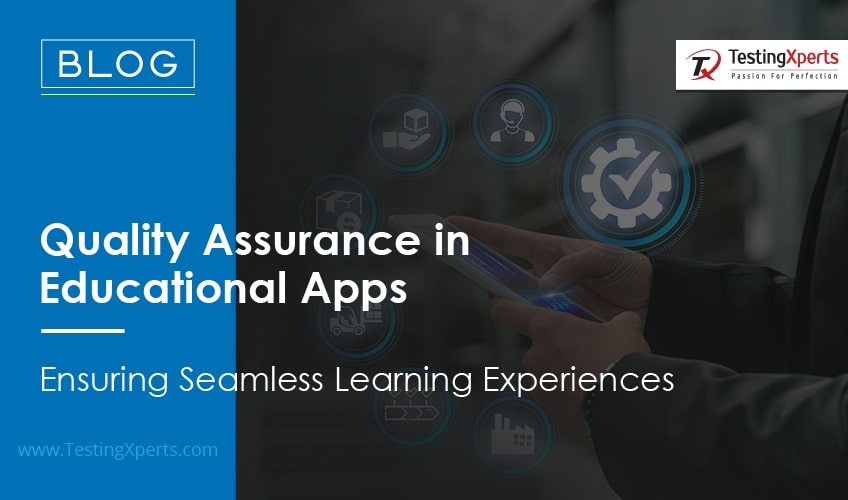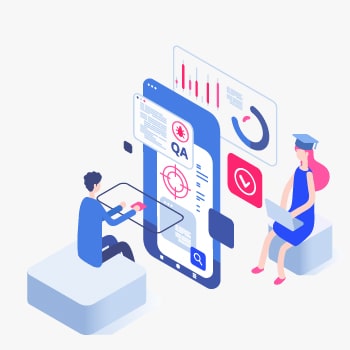
In the digital age, educational apps have revolutionized the way we learn, offering interactive and engaging experiences for students of all ages. However, as the demand for educational apps continues to rise, so does the need for robust quality assurance processes to ensure seamless learning experiences. With the global e-learning market projected to reach $1.6 trillion by 2025, it is crucial to address the challenges that may arise in educational app development. Statistics reveal that a staggering 79% of students believe that technology plays a vital role in their learning process.
Additionally, with over 5 million educational apps available for download, competition is fierce, and users have high expectations for functionality, usability, and content quality. In this blog, we will explore the importance of quality assurance in educational apps and how it can contribute to delivering exceptional learning experiences while meeting user expectations.
Why is it Required to Invest in Quality Assurance in Educational Apps Now?

The recent landscape of education has undergone a significant transformation, with a greater reliance on technology and digital platforms. As such, it is the perfect time to invest in quality assurance for educational apps to ensure optimal learning experiences.
One example that highlights the importance of quality assurance is the recent surge in remote and hybrid learning models due to the COVID-19 pandemic. With students heavily dependent on educational apps for accessing learning materials and engaging with content, any technical glitches or usability issues can disrupt the learning process and hinder educational outcomes. By investing in quality assurance, educational institutions and app developers can identify and resolve potential issues before they impact students’ learning experiences.
Another example is the increasing adoption of personalized learning through educational apps. These apps offer tailored content and adaptive features to cater to individual students’ needs and learning styles. However, ensuring the accuracy and effectiveness of personalized features requires rigorous quality assurance testing. For instance, a quality assurance process can validate that the app accurately tracks students’ progress, delivers relevant content recommendations, and adjusts difficulty levels appropriately. This ensures that students receive personalized learning experiences that enhance their educational journey.
How is an Educational App Measured for Quality Assessment?

An educational app is measured for quality assessment through various methods to ensure its overall quality and effectiveness. Here are some key aspects considered during quality assurance testing:
Alignment with Learning Objectives:
Quality assurance assesses whether the educational app aligns with the intended learning objectives and curriculum standards. The content and activities should be designed to support specific educational goals, ensuring that students receive relevant and meaningful instruction.
Accuracy and Validity:
Educational apps must provide accurate and reliable information to ensure the credibility of the content. Quality assurance evaluates the accuracy of facts, data, and references used within the app. It also verifies that the content is up to date and reflects current knowledge and research.
Interactivity and Engagement:
Quality assurance ensures that an educational app offers interactive and engaging elements that promote student participation and active learning. This includes features like quizzes, simulations, gamification, and multimedia resources. The app should provide opportunities for students to apply their knowledge, receive feedback, and stay motivated throughout the learning process.
Progress Tracking and Assessment:
Quality assurance evaluates how an educational app tracks students’ progress and provides assessments. The app should accurately record students’ achievements, performance, and completion of tasks or modules. It should also offer appropriate feedback and assessment mechanisms to help students gauge their understanding and identify areas for improvement.
Accessibility and Inclusivity:
Educational apps should be accessible to a diverse range of learners, including those with disabilities or special needs. Quality assurance verifies if the app follows accessibility guidelines, such as providing options for text-to-speech, closed captions, adjustable font sizes, and compatibility with assistive technologies. This ensures that all students can access and benefit from the app’s content.
Stability and Performance:
Quality assurance examines the app’s stability, performance, and responsiveness under heavy concurrency of users and consistent usage of the application across different time zones for extended periods. This testing helps identify and address any potential crashes, slow load times, or performance issues that may disrupt the learning experience.
Security and Privacy:
Educational apps handle sensitive student data, so quality assurance verifies that appropriate security measures are in place to protect user information. This includes encryption protocols, secure login procedures, data backups, and compliance with privacy regulations like the Family Educational Rights and Privacy Act (FERPA).
By thoroughly assessing these aspects, quality assurance ensures that an educational app meets high standards of quality, usability, and educational effectiveness, resulting in a seamless learning experience for students.
Best Practices for EdTech Software Testing
Quality assurance testing makes sure that educational technology (EdTech) platforms work well, are reliable, and easy to use for all kinds of learners.

Some good ways to test EdTech to make sure it works properly are
Creating Comprehensive Test Cases for Different User Scenarios
Make detailed test cases for a wide range of user scenarios that helps to identify potential issues and ensures an uninterrupted user experience.
Implementing a Systematic Regression Testing Process
Setting up a structured way to regularly ensure that any changes or updates do not introduce unexpected bugs.
Prioritizing Accessibility Testing for Diverse Learners
Prioritize accessibility testing to ensure that all learners, regardless of their abilities or backgrounds, can easily use the technology.
Establishing Clear Communication Channels Between Developers and Testers
Straightforward communication and sharing information between developers and testers ensuring smooth collaboration and understanding.
Leveraging Analytics and User Feedback for Ongoing Improvement
QA testers gather information from analytics tools and users to continually make the technology better over time.
How a Few Educational Apps Achieved Success with better Quality Assurance Check?

Here are a few success stories of educational apps that have performed well due to successful quality testing:
Duolingo:
Duolingo is a popular language learning app that has garnered widespread acclaim for its quality and effectiveness. Through rigorous quality testing, Duolingo ensures a seamless and gamified learning experience for users. The app’s interactive exercises, progress tracking, and adaptive learning algorithms have contributed to its success in helping millions of users learn new languages.
Quizlet:
Quizlet is an app that offers a variety of study tools, flashcards, and quizzes for a wide range of subjects. The app’s success is due, in part, to quality testing that ensures a smooth user experience, accurate content, and efficient study features. Quizlet’s ability to adapt to individual learning needs and provide interactive study materials has made it a valuable resource for students worldwide.
These success stories highlight the importance of quality testing in developing educational apps that deliver on their promises, provide seamless learning experiences, and effectively support students’ educational journeys.
Conclusion
The role of quality assurance in ensuring seamless learning experiences in educational apps cannot be overstated. With the global e-learning market projected to reach $1.6 trillion by 2025, it is crucial to invest in robust quality assurance processes. Statistics reveal that 79% of students believe technology plays a vital role in their learning process, emphasizing the need for high-quality educational apps. Additionally, with over 5 million educational apps available for download, competition is fierce. Quality assurance becomes paramount in distinguishing apps that perform well. By conducting comprehensive functionality and usability testing, verifying content accuracy, and ensuring accessibility, educational apps can meet user expectations and deliver exceptional learning experiences. Quality assurance also helps educational app developers stay ahead of the curve, reducing technical glitches, improving user satisfaction, and increasing adoption rates. By investing in quality assurance, we can ensure that educational apps become powerful tools for seamless and effective learning experiences in the digital age.
How can TestingXperts help with the Testing of the Educational Apps?

TestingXperts is a leading software testing company in Uk that can provide expert assistance in testing educational apps to ensure their quality, functionality, and user experience. With a team of skilled testers and a comprehensive understanding of the unique requirements of educational apps, TestingXperts can develop customized testing strategies and plans. They conduct thorough testing to evaluate the app’s functionality, usability, content quality, compatibility across different devices and platforms, and adherence to accessibility guidelines. TestingXperts can perform various types of testing, including functional testing, usability testing, performance testing, security testing and accessibility testing. By partnering with TestingXperts, educational app developers can benefit from their expertise and meticulous testing processes, resulting in a well-tested and high-quality app that delivers a seamless and engaging learning experience for students.
Discover more
Get in Touch
Stay Updated
Subscribe for more info




